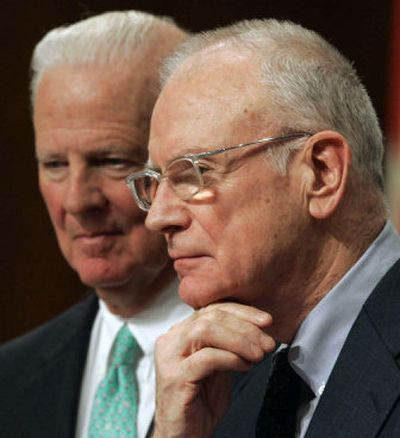It’s Bush’s move

WASHINGTON – With the release of the Iraq Study Group’s report on Wednesday, President Bush now has the outlines of a bipartisan exit strategy for Iraq and a new secretary of Defense to help carry it out.
And while he’s under no obligation to heed the recommendations of the national commission headed by former Secretary of State James A. Baker III and former Rep. Lee Hamilton, the pressure on the president to change course is now politically enormous.
Whether he’ll go along, when, and to what extent, will shape the nation’s political landscape in the months to come.
In a major reappraisal that challenges Bush’s view of the war, the bipartisan Iraq Study Group declared Wednesday that Bush administration policies have set off a “slide toward chaos” in Iraq.
In uncompromising and dismal terms, the panel said the continuing deterioration in Iraq could inflame the entire region in a deadly war that would further curtail U.S. influence throughout the world. It issued 79 recommendations that counter many hardened administration stances, such as holding talks with Syria and Iran and reassigning U.S. forces as advisers – a proposal that could enable the withdrawal of combat troops by early 2008.
“The current approach is not working, and the ability of the United States to influence events is diminishing,” said Hamilton. “Many Americans are understandably dissatisfied. Our ship of state has hit rough waters. It must now chart a new way forward.”
The report of the 10-member Iraq Study Group, coming after midterm elections widely seen as a repudiation of Bush’s war policy, is certain to further transform the growing national debate on the war, with Democrats and many Republicans agreeing Wednesday that its conclusions pointed to the urgent need for new policies.
But even as pressure grows on the White House to change course, Bush stopped short of any immediate endorsement of the recommendations. The president has signaled that he is considering strategy proposals from a number of sources, but told members of the study group in a morning meeting that he viewed their report as “unique” because of the panel’s bipartisan composition.
Bush’s remarks were conciliatory but general. In the past, Bush has sometimes sounded ready to embrace changes only to go back to the kind of stubborn line he used as recently as last week in Jordan – that U.S. troops won’t leave until the mission is complete.
The report came a day after Robert M. Gates, Bush’s nominee to head the Pentagon, told Congress that America was not winning the war, and just days after disclosure of a memo by outgoing Defense Secretary Donald H. Rumsfeld in which he said that U.S. strategy required a “major adjustment.”
In its 96-page report, the panel urged the Bush administration to initiate a “diplomatic offensive” to stabilize Iraq, and include talks with Syria and Iran. They recommended that U.S. forces step up their shift from combat to an advisory role, thus allowing the Pentagon to withdraw nearly all of its 15 combat brigades by early 2008.
And they urged the administration to actively prod leaders of Iraq’s government toward political progress, withholding military, economic and diplomatic help if necessary. The report said the administration should set benchmarks for progress by Iraqis, and should make clear that the mission is “not open-ended.”
The five Republicans and five Democrats urged the recommendations be instituted as a set. “Our three most important recommendations are equally important and reinforce one another,” Hamilton said.
For Bush to accept the recommendations, he would have to change course on a number of key issues. He has largely ruled out talks with Syria and Iran, and resisted proposals for setting timetables for Iraqi government progress.
And he has shown no interest in pressing for an Israeli-Palestinian settlement, as the report urged, until the Palestinians establish a government that wins American approval and take other steps.
The report, approved by such conservatives as former Reagan administration Attorney General Edwin Meese and former Sen. Alan K. Simpson, R-Wyo., was striking in its harsh critique of conditions in Iraq nearly four years after the U.S. invasion.
While the White House continues to point to signs of progress, the report emphasized the “great suffering” of ordinary Iraqis, persistent disorder, government inefficiency and corruption, economic setbacks, and the weaknesses of the Iraqi military and police. The report criticized the U.S. reconstruction effort – saying that among U.S. government agencies, “there are no clear lines establishing who is in charge” – and faulted Iraq’s neighbors and international donor countries for doing little to help it.
It noted that the war has resulted in nearly 2,900 American deaths, 21,000 wounded, and costs projected to rise to $2 trillion.
“The United States is spending $2 billion a week,” commission members wrote. “Our ability to respond to other international crises is constrained. A majority of the American people are soured on this war. This level of expense is not sustainable over an extended period, especially when progress is not being made.”
The report faulted U.S. practices for “under-reporting” violence in Iraq, saying American officials leave out many deaths that may be the result of war or insurgent action.
Wednesday’s was the first in a series of major reports on war options heading for the White House, including ones by the Pentagon and the National Security Council.
Bush could cherry pick, selecting the most palatable recommendations from among the 79 in the Baker-Hamilton pages, and taking others from other reports.
But the Iraq Study Group’s report came with a warning label. It said the recommendations amount to “a new way forward. They are comprehensive and need to be implemented in a coordinated fashion. They should not be separated or carried out in isolation.”
The president called the report “a very tough assessment of the situation in Iraq” and said he would take the recommendations very seriously and act “in a timely fashion.” He also said, pointedly, that Congress wouldn’t agree with every proposal, and neither would he.